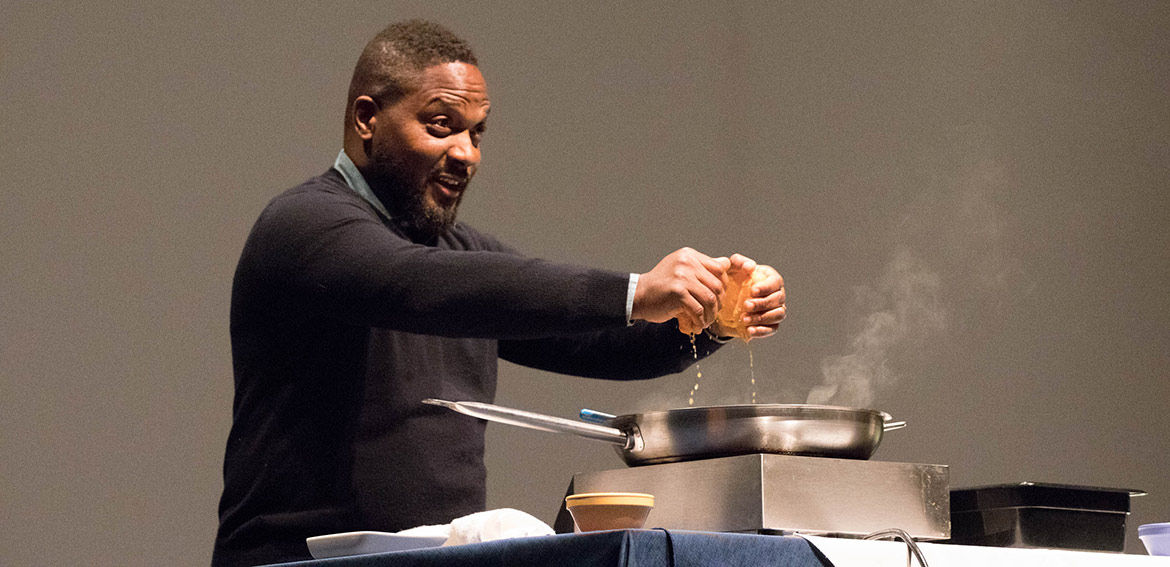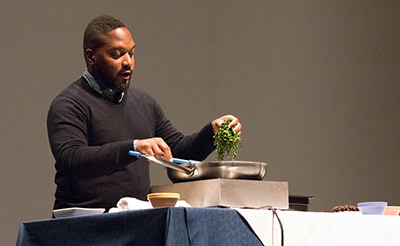

As the end of the semester approaches, so does the conclusion of The Year of Food in the Gettysburg Cycle—and Bryant Terry’s presentation, Food Justice: At the Intersection of Food, Politics, Poverty, Public Health, and the Environment, held on April 4 at the Majestic Theater, served as a perfect end-cap to this year’s programming.
Terry, a chef, author, and food justice activist, started his presentation with a song he heard his grandmother sing as she cooked. Memories and moments like these hold power, he said, and there were several that led him to his career path. One that sticks out in his mind: as a student attending New York University, Terry observed young children drinking soda for breakfast. He knew this was unhealthy but also not uncommon for people of color living in cities or communities that are food deserts (areas without healthy food options). Today, Terry uses cooking as a way to build awareness of food issues, bringing people around the metaphorical table to spark a political movement to provide equal access to healthy foods in urban communities.
 “Transformative moments don’t always happen by themselves,” said Terry on stage, stirring freshly cooked collard greens in a pan. “They can be served up like your grandmother’s dish. They can be planned.”
“Transformative moments don’t always happen by themselves,” said Terry on stage, stirring freshly cooked collard greens in a pan. “They can be served up like your grandmother’s dish. They can be planned.”
His mantra: “Start with the visceral to ignite the cerebral and end with the political.” The message was not lost on the audience, who left with the smell of garlic in their noses and issues of food justice on their minds.
Maureen Forrestal, dean of fellowships, scholarships, and undergraduate research & creative activity, first saw Terry present at the National Conference on Undergraduate Research and knew his talk would be a perfect fit for the Year of Food, which was designed to engage students in local, national, and global food issues. Research, she said, is one way to make an impact on the community—a point echoed by Terry, who said it’s important to bring community members around the table. Too often, he said, they are not included in the very discussions of policies impacting them.
“My hope is that students who think they’re not interested in traditional research will begin to see it as a useful tool for accomplishing food and environmental justice,” Forrestal said.

Forrestal and Paula Baer coordinated a group of 12 students to present their posters and research before and after Terry’s presentation in the lobby of the theater. Topics included issues such as an examination of the food production system and how protein transcription factors affect plant development and crop yield, just to name a couple. The projects represented multiple disciplines, ranging from art history to environmental studies, biology, philosophy, and health sciences—each connecting to issues of food from different angles.
Micaela Edelson ’17, an environmental studies and public policy double major, presented her research on the pesticide exposure risk to migrant farmworkers in Adams County, PA.
“The systemic food insecurity faced by low-income and minority communities is, unfortunately, not widely understood,” said Edelson, who is also passionate about food justice issues, having started a project on campus to sell Challah to raise money for Campus Kitchen. “Terry was able to inform us not only on the issue but also on ways to address it in an informative and entertaining way.”
The day following his presentation, Terry toured The Painted Turtle Farm and met with leaders, faculty, and community partners of the Center for Public Service, whose mission it is to foster social justice by promoting personal, institutional, and community change.
Support for Terry’s presentation was provided by the Hanson Lecture Series through the Foundation for Enhancing Communities and Gettysburg College’s Office of the Provost: Undergraduate Research & Creative Activities Program.
Next year, the Gettysburg Cycle will focus on The Year of Health. Learn more about the Gettysburg Cycle.


